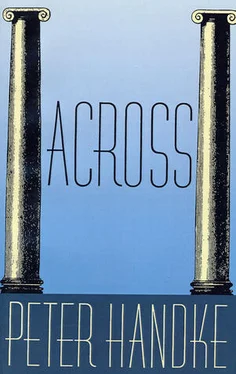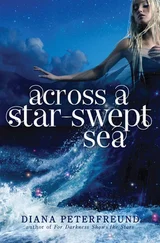Peter Handke - Across
Здесь есть возможность читать онлайн «Peter Handke - Across» весь текст электронной книги совершенно бесплатно (целиком полную версию без сокращений). В некоторых случаях можно слушать аудио, скачать через торрент в формате fb2 и присутствует краткое содержание. Год выпуска: 2000, Издательство: Farrar, Straus and Giroux, Жанр: Современная проза, на английском языке. Описание произведения, (предисловие) а так же отзывы посетителей доступны на портале библиотеки ЛибКат.
- Название:Across
- Автор:
- Издательство:Farrar, Straus and Giroux
- Жанр:
- Год:2000
- ISBN:нет данных
- Рейтинг книги:3 / 5. Голосов: 1
-
Избранное:Добавить в избранное
- Отзывы:
-
Ваша оценка:
- 60
- 1
- 2
- 3
- 4
- 5
Across: краткое содержание, описание и аннотация
Предлагаем к чтению аннотацию, описание, краткое содержание или предисловие (зависит от того, что написал сам автор книги «Across»). Если вы не нашли необходимую информацию о книге — напишите в комментариях, мы постараемся отыскать её.
Across — читать онлайн бесплатно полную книгу (весь текст) целиком
Ниже представлен текст книги, разбитый по страницам. Система сохранения места последней прочитанной страницы, позволяет с удобством читать онлайн бесплатно книгу «Across», без необходимости каждый раз заново искать на чём Вы остановились. Поставьте закладку, и сможете в любой момент перейти на страницу, на которой закончили чтение.
Интервал:
Закладка:
I sat down at my desk, picked up a pencil, and wrote in the flyleaf of Virgil’s Georgics : “Not an unfortunate accident, but destiny. Take accident as destiny. Not mine, but everyone’s. Destiny as man’s lot. Not his human lot, but his share. Distinguish two sorts of human destiny: lot and share. Man’s lot: as everyone knows, to die. His share? All I know is that if I haven’t had my share, I shall die without having fulfilled my destiny. My share is up to me; to obtain it, that is, I must challenge it. From disaster to destiny. Through destiny to self-awareness. I am determined and self-determined. Surrender? Yes, but not to any judge. No, I will not ‘surrender,’ I will seek out a witness. What for? To ask for advice. Who will be my witness? And time and again ‘the threshold’; lest you pass it by, slow down to a child’s pace. No, don’t slow down; restrain yourself. — Sunflower in the mist. — The epithet for hibiscus in Virgil: slender.”
A pyramid of wood for the Easter bonfire, heaped up at the point where the road passes into the meadow, was illumined by the last light of day. I went from window to window, this way and that, through the whole apartment. Now and then, on the slopes, a trial cannon shot rang out. A freshly washed bus was waiting at the terminus; with its two long, thick arms, it looked like a great stag. For a moment, the portholes of a plane taking off became transparent, revealing the bright blue sky behind them; for a long while, flocks of black crows followed its sooty trail, just as gulls follow the wake of a ship. Below, a child popped paper bags while walking in the street — his version of an Easter salute; while a teenager ran back and forth in an orchard, snapping a whip, which at every crack sent little clouds of smoke rising between the treetops.
This time, a different couple were sitting on the bridge railing: an elderly man in a double-breasted suit with a pocket handkerchief, tie, and white shirt, holding a younger woman close, murmuring and whispering as he rubbed his head against hers, and occasionally prodding her with his forehead; if they should fall into the canal, I thought, the water would hiss as if something red-hot had been dropped in.
Otherwise, the streets were deserted. But, undoubtedly, crowds were pouring into the churches for the Feast of the Resurrection. The mountains looked blue; then gray; then black. The rows of light at the airfield suggested a fiery cross, traversed by a constantly renewed arrow. The border station on the horizon gleamed like a factory decked out for a holiday.
Love welled up in me for this city in the plain. Its cityness. Substance of joy. The earth awakened within me, with a white Mayan city on the chalk cliffs of Yuca-tán, and with Heraclitus, warming himself by his stove and calling out to visitors: “Come in. Here, too, there are gods.” I wanted to throw myself on the ground, but not alone. At that moment, a single word sufficed: “Here!”
At length, the cathedral bells rang out in the distance. There the ritual of transubstantiation was being enacted: bread into “body,” wine into “blood.” The bell sounded twice, both times very briefly. It was as though a heart that had stopped beating began to beat again. A horse raised its head and showed its great eye with its light-colored, bristling lashes. The beaks of the gulls were at their sharpest and most hooked.
Little by little, the bells began to ring throughout the city area. I distinguished the bells of Elsbethen, of Aigen, of Persch, of Gnigl, of Sankt Andra, of Maria Plain, of Bergheim, of Freilassing (across the border), of Bayrischgmain, of Grossgmain (back on this side), of Liefering, of Wals, of Gois, of Taxham, of Grödig, of Anif, of Morzg, of Gneis; the bells of the Meadow Church, of the Moos Church, of the Old People’s Home Church, of the Dormitory Church, of the Poorhouse Church.
During the night, there was a violent knocking on the water pipes. The hibiscus blossom rolled up and fell off its stem, with a very soft sound. A warm wind blew through the wide-open room. There was a smell of wood smoke. Even before the first bus arrived, I heard a twanging in the wires like a catapult in action, followed by a crash, as between two hockey sticks. Up until then, it had been so quiet that the waterfalls in the mountains could be heard. Later on, a strange melody sounded from end to end of the plain. In my half-sleep — which was more like a special kind of waking — separate sounds answered one another and thus became music. A train whistle was followed by the rumble of a steel grating under rolling wheels. The rumbling was taken up by a barking dog. The dog’s barking took on the tone of the wind in the trees, which in turn blended into the enveloping sound of a short rainfall. Actually, it was not so much a melody as a leitmotif prolonged indefinitely. Every new sound took it up and intensified it. Every object that emitted a sound swelled, as it were, in my imagination and vibrated, converted into a musical instrument. Plucked instruments, percussion and wind instruments rang out, interspersed with an infrequent but precisely timed violin tone, as though from a mountain lake freezing over. The sound of the rain was rhythmed by a vibraphone-like ringing far below the road, rising from the round openings of the manhole cover. I had once taken the children to see a film in which terrestrial and extraterrestrial beings conversed by means of such a persistently repeated motif. Had extraterrestrial beings landed now, and was this sound their signal? No, this was an earthly sound, an earthly creature lay dreaming, and his breathing through a single orifice fed the earthly orchestra. Dreaming? I had never felt so wide-awake. A more delightful wake-up music was unthinkable.
I arose with the first light and washed the windows and floors of both my rooms. Outside, the bog appeared with its earth colors — green, brown, ocher, and black. It was blanketed in haze, purple in the dawning light. The great flank of the Staufen emerged from the western horizon, shimmering white like a strange star. “Beloved colors! It is by contemplating you that we live.”
I dressed after laying garment after garment over my arm like my own valet: blue-and-white-striped shirt, silk tie, double-breasted summer suit, black low-cut leather shoes, long, light-gray “dustcoat”; and into my breast pocket I slipped the hibiscus blossom, which had shrunk to a reddish cigar. I went to the mirror, looked for a long while into my eyes, and for once found myself beautiful. I filed my nails to a perfect roundness. With a single unbroken movement, I put my hat on. I leafed through my paper money, rolled it up, and thrust it into my trouser pocket. I left my apartment without locking the door.
On the street, an old crone, her face and neck a network of wrinkles forming innumerable tiny hexagons, approached and said: “Here comes Mr. Springtime.” The cracks in the asphalt at the edge of the street also formed a hexagonal pattern. A young man in uniform, wearing pointed shoes and carrying a suitcase, crossed the canal bridge. As the sun rose, a dog ran down a path through the meadow, swaying from side to side against the light like a covered wagon in the Wild West. And I did indeed bear westward, though from time to time I veered off to the north and south; or just stood there for a while. Now and then, I walked backward and then I had the eastern sun in my face. The sun didn’t disperse the ground haze but gave it a bright color. Later, it took on a lasting lilac hue, against which the branches of the trees looked intensely black.
On the Untersberg, there was snow only above the tree line; the plateau at the top was mottled with it. The whole mountain was sharply outlined; every gully and every crag stood out distinctly; only the hollow below the summit seemed a caldron of clouds, sending out spiral after spiral of mist. One of these took the shape of a giant eagle and went flying over the plain, hunting with talons outstretched and an eye of azure blue.
Читать дальшеИнтервал:
Закладка:
Похожие книги на «Across»
Представляем Вашему вниманию похожие книги на «Across» списком для выбора. Мы отобрали схожую по названию и смыслу литературу в надежде предоставить читателям больше вариантов отыскать новые, интересные, ещё непрочитанные произведения.
Обсуждение, отзывы о книге «Across» и просто собственные мнения читателей. Оставьте ваши комментарии, напишите, что Вы думаете о произведении, его смысле или главных героях. Укажите что конкретно понравилось, а что нет, и почему Вы так считаете.












